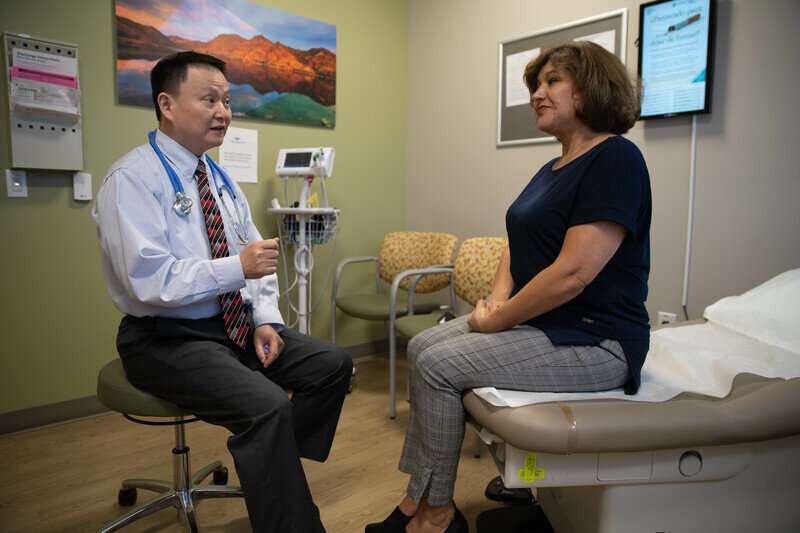When patients request or demand an antibiotic, even when it is unlikely to help, a physician might be tempted to give in and write a prescription, especially if they're working in a busy setting like an urgent care or emergency department.
However, a major new study by researchers at Intermountain Health and Stanford University finds that overprescribing and inappropriate prescribing of antibiotics is not only leading to antibiotic resistance—but also causing significant patient harm. It's one of the most comprehensive studies to document the impact of antibiotic overuse in clinical practice.
Every year, there are enough outpatient antibiotics prescribed in the US to cover 80% of the population. The study, published in the Journal of Internal Medicine, examined 51 million patient encounters over a 15-year-period and focused on upper respiratory infections where antibiotics were known to be overprescribed 50% of the time.
Researchers found that some of the most dangerous antibiotics were rarely indicated and commonly used, leading to one in 300 of those patients experiencing side effects dire enough to require a follow up doctor's visit—or even hospitalization.
This study was one of the few studies large enough to estimate serious but rare adverse events such as a potentially deadly diarrheal infection, Clostridium difficile. With previous studies showing 34 million unnecessary antibiotic prescriptions annually in the US, this translates to real harm for many patients and families.
"These findings underscore that inappropriately giving patients antibiotics is causing real and widespread harm," said Harris Carmichael, MD, principal investigator of the study and hospitalist at Intermountain Health in Salt Lake City. "Having these kinds of side effects for one in a few hundred, or even a thousand, patients may not seem like a lot, but when you look at this problem on a population health level, we're talking about hundreds of thousands of adverse events severe enough that these patients needed additional care from a doctor."
That means time off work and school for families, unnecessary doctor visits, and risks of serious infections that can last for months or years.
In the retrospective study, researchers from Intermountain and Stanford reviewed insurance claims from the Clinformatics Data Mark Database.
Using data from Medicare Advantage and commercial insurance patients in all 50 states, inpatient and outpatient administrative claims, pharmaceutical claims, and patient demographics for beneficiaries seen between December 2002 and December 2017, they found 50.9 million claims for upper respiratory infections, including sinusitis, pharyngitis, laryngitis, bronchitis and the common cold, representing 23 million unique patients.
Researchers then identified instances when patients did and did not receive oral antibiotics for an upper respiratory infection, and if those patients were diagnosed with either diarrhea, candidiasis, Clostridium difficile infection or a mix of these side effects thereafter.
They found that 62.4% of these upper respiratory infection patients filled a prescription for an antibiotic, consistent with prior studies of this population. Following their initial visits, 26% of those patients had a follow-up outpatient visit within 14 days.
The odds of a patient being diagnosed with an adverse event increased 30% for those receiving antibiotics. Adverse events following antibiotics were found in as many as one in 300 prescriptions, depending on the antibiotic prescribed, or one in 1,150 prescriptions overall.
"With millions of visits for upper respiratory infections in the United States each year, the extent of these severe adverse events is significant," said Dr. Carmichael.
Researchers also found that the antibiotic Cefdinir was the fourth most prescribed antibiotic for these patients, despite it rarely being recommended by prescription guidelines as an appropriate treatment for simple upper respiratory infections.
This drug also had the second highest chance of leading to an adverse event. That means that patients are being prescribed a medication that is either not needed at all or unlikely to be the most appropriate medication for their condition and is routinely causing harm, said Dr. Carmichael.
He added that the chance of adverse events is likely much higher, as these results only capture follow-up visits where their adverse event was coded as such for insurance purposes.
That means the results do not include adverse events where physicians didn't code for that specific side effect, nor for patients who weren't sick enough to be seen in a doctor's office but may still have had additional and unnecessary time for recovery.
These findings point to the increasingly important need for antibiotic stewardship programs, so that physicians are following prescribing guidelines and "only prescribe antibiotics when necessary, and then it's the right antibiotics for the right condition," said Dr. Carmichael.
When Intermountain implemented their own enhanced antibiotic stewardship programs, which included explaining to patients why they weren't being prescribed an antibiotic if they asked for it, the health system reduced their overall prescribing rates by more than 15%.
"Patients don't get upset when they don't get antibiotics, as long as we take the time to explain their condition and that we're treating them in the way that is best for them," said Dr. Carmichael.
- Karlston
-

 1
1



Recommended Comments
There are no comments to display.
Join the conversation
You can post now and register later. If you have an account, sign in now to post with your account.
Note: Your post will require moderator approval before it will be visible.